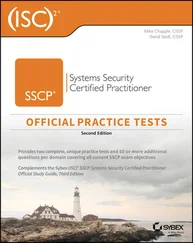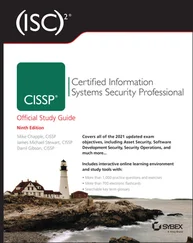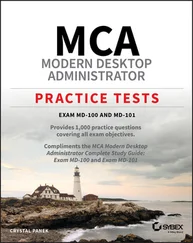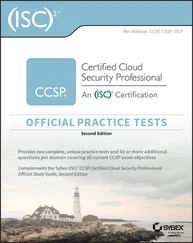David holds a bachelor's degree in communication technology and a master's degree in information security from Eastern Michigan University, as well as CISSP, CySA+, Pentest+, GPEN, and GCIH certifications.
About the Technical Editors
Ben Malisowis a consultant and writer with more than 25 years of experience in the fields of information, security, and information security. He teaches SSCP, CISSP, and CCSP preparation courses for (ISC)2 and has written the Official (ISC)2 CCSP Study Guide and the Official (ISC)2 Practice Tests books, among other titles; his latest works include CCSK Practice Tests and Exposed: How Revealing Your Data and Eliminating Privacy Increases Trust and Liberates Humanity . He and his partner Robin Cabe host the weekly podcast, “The Sensuous Sounds of INFOSEC,” from his website www.securityzed.com.
Jerry Rayome,BS/MS Computer Science, CISSP, employed as a member of the Cyber Security Program at Lawrence Livermore National Laboratory for over 20 years providing cyber security services that include software development, penetrative testing, incident response, firewall implementation/administration, firewall auditing, honey net deployment/monitoring, cyber forensic investigations, NIST 900-53 control implementation/assessment, cloud risk assessment, and cloud security auditing.
( ISC) 2 ® CISSP ® Certified Information Systems Security Professional Official Practice Tests is a companion volume to (ISC) 2 CISSP Certified Information Systems Security Professional Official Study Guide . It includes questions that cover content from the CISSP Detailed Content Outline and exam that became effective on May 1, 2021. If you're looking to test your knowledge before you take the CISSP exam, this book will help you by providing more than 1,300 questions that cover the CISSP Common Body of Knowledge and easy-to-understand explanations of both right and wrong answers.
If you're just starting to prepare for the CISSP exam, we highly recommend that you use (ISC) 2 CISSP Certified Information Systems Security Professional Official Study Guide to help you learn about each of the domains covered by the CISSP exam. Once you're ready to test your knowledge, use this book to help find places where you may need to study more or to practice for the exam itself.
Since this is a companion to CISSP Study Guide , this book is designed to be similar to taking the CISSP exam. It contains multipart scenarios as well as standard multiple-choice and matching questions similar to those you may encounter on the certification exam. The book is broken up into 12 chapters: 8 domain-centric chapters with 100 or more questions about each domain, and 4 chapters that contain 125-question practice tests to simulate taking the exam.
The CISSP certification is offered by the International Information System Security Certification Consortium, or (ISC) 2, a global nonprofit organization. The mission of (ISC) 2is to support and provide members and constituents with credentials, resources, and leadership to address cyber, information, software, and infrastructure security to deliver value to society. (ISC) 2achieves this mission by delivering the world's leading information security certification program, the CISSP. (ISC)2 also offered five additional certifications including: (ISC)2 also offered five additional certifications including:
Systems Security Certified Practitioner (SSCP)
Certified Authorization Professional (CAP)
Certified Secure Software Lifecycle Professional (CSSLP)
HealthCare Information Security and Privacy Practitioner (HCISPP)
Certified Cloud Security Professional (CSP)
There are also three advanced CISSP certifications for those who want to move on from the base credential to demonstrate advanced expertise in a domain of information security.
Information Systems Security Architecture Professional (CISSP-ISSAP)
Information Systems Security Engineering Professional (CISSP-ISSEP)
Information Systems Security Management Professional (CISSP-ISSMP)
The CISSP certification covers eight domains of information security knowledge. These domains are meant to serve as the broad knowledge foundation required to succeed in the information security profession.
Security and Risk Management
Asset Security
Security Architecture and Engineering
Communication and Network Security
Identity and Access Management (IAM)
Security Assessment and Testing
Security Operations
Software Development Security
The CISSP domains are periodically updated by (ISC) 2. The most recent revision May 1, 2021 slightly modified the weighting for Communication and Network security from 14 percent to 13 percent while increasing the focus on Software Development Security from 10 percent to 11 percent. It also added or expanded coverage of topics such as the data management lifecycle, microservices, containerization, serverless computing, quantum computing, 5G networking, and modern security controls.
Complete details on the CISSP Common Body of Knowledge (CBK) are contained in the Exam Outline. It includes a full outline of exam topics, can be found on the (ISC) 2website at www.isc2.org.
The English version of the CISSP exam uses a technology called computer adaptive testing (CAT). With this format, you will face an exam containing between 100 to 150 questions with a three-hour time limit. You will not have the opportunity to skip back and forth because the computer selects the next questions that it asks you based upon your answers to previous questions. If you're doing well on the exam, it will get more difficult as you progress. Don't let that unnerve you!
Other versions of the exam in French, German, Brazilian Portuguese, Spanish, Japanese, Simplified Chinese, and Korean use a traditional linear format. The linear format exam includes 250 questions with a six-hour time limit. For either version of the exam, passing requires achieving a score of at least 700 out of 1,000 points. It's important to understand that this is a scaled score, meaning that not every question is worth the same number of points. Questions of differing difficulty may factor into your score more or less heavily, and adaptive exams adjust to the test taker.
That said, as you work through these practice exams, you might want to use 70 percent as a goal to help you get a sense of whether you're ready to sit for the actual exam. When you're ready, you can schedule an exam at a location near you through the (ISC) 2website.
Questions on the CISSP exam are provided in both multiple-choice form and what (ISC) 2calls advanced innovative questions, which are drag-and-drop and hotspot questions, both of which are offered in computer-based testing environments. Innovative questions are scored the same as traditional multiple-choice questions and have only one right answer.

(ISC)² exam policies are subject to change. Please be sure to check isc2.orgfor the current policies before you register and take the exam.
Computer-Based Testing Environment
CISSP exams are now administered in a computer-based testing (CBT) format. You'll register for the exam through the Pearson Vue website and may take the exam in the language of your choice. It is offered in English, French, German, Portuguese, Spanish, Japanese, Simplified Chinese, Korean, and a visually impaired format.
Читать дальше













